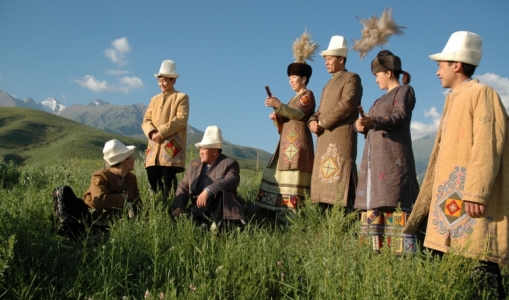Note: Audio is placed below the main text, when available.
THE AGA KHAN VISITS WASHINGTON - 2006-03-15
His Highness the Aga Khan attended the the inaugural concert of Via Kabul: Central Asia Without Borders at the Freer Gallery
Washington, USA, 15 March 2006 - Dignitaries from Washington’s political, diplomatic, legal and cultural fields today joined His Highness the Aga Khan at the inaugural concert of Via Kabul: Central Asia Without Borders at the Freer Gallery’s Meyer Auditorium. The concert was the first performance of the 2006 USA tour, which will continue with another concert on the 16th at the Freer Gallery before moving on to the Columbia University campus in New York for master classes and a concert (March 21 at the Miller Theatre). The tour will move on to Texas (March 24 at the Rudder Theatre at Texas A&M in College Station), New Mexico (March 25 at the KiMo theatre in Albuquerque) and Ohio (April 4th at Miami University’s Hall Auditorium in Oxford).
The tour -- presented and curated by the Aga Khan Music Initiative in Central Asia -- features three groups of performers: Tengir-Too, from Kyrgyzstan; The Academy of Maqâm, from Tajikistan; and Homayun Sakhi and Taryalai Hashimi, from Afghanistan (via California).
The Wednesday concert marked the release, on Smithsonian Folkways, of Music of Central Asia, Volumes 1-3. The innovative series, which will eventually comprise 10 volumes, includes a CD, a DVD with a documentary film on the featured musicians, as well as interactive instrument glossaries and maps. The series is a co-production of the Aga Khan Music Initiative in Central Asia (a programme of the Aga Khan Trust for Culture) and the Smithsonian Institution Center for Folklife and Cultural Heritage.
The tour features the most celebrated Afghan rubâb player of his generation, Homayun Sakhi, a performer who fled his country after the Soviet invasion, developed a new musical style while living in exile in Peshawar, Pakistan, and now makes his home in Fremont, California.
The Tour includes the The Academy of Maqâm, from Tajikistan, which plays the Sufi-inspired court music of Samarkand and Bukhara, cities that are located in current-day Uzbekistan.
The Tour also reveals the effervescent music of the Kyrgyz mountain nomads in the form of Tengir-Too. The ensemble, led by Nurlanbek Nyshanov, plays oral-tradition songs, employing instruments called the choor and the kylkiyak, as well as the Jew’s harp. Of particular note for those audiences who would like to experience recitation on a Homeric scale, Tengir-Too’s Rysbek Jumabaev channels the voice of a warrior in a thousand-year-old Kyrgyz poem thirty times longer than the Iliad. Mr. Jumabaev, who typically holds Central Asian audiences spellbound for eight hours or more, often stuns Western audiences (as he did earlier at Carnegie Hall) with his invocation of the horsemen of the 500,000-line Manas epic. The epic’s central theme is how the hero Manas holds off the Mongol hordes and other enemies.
Several of the musicians featured in “Via Kabul: Central Asia without Borders” made cameo appearances in the panoramic Smithsonian Folklife Festival of 2002, “The Silk Road: Connecting Cultures, Creating Trust”. The present tour, however, offers an in-depth look at the rich and diverse musical traditions of a region that is experiencing a cultural reawakening after decades of Soviet rule.
- 5050 reads
 Ismaili.NET - Heritage F.I.E.L.D.
Ismaili.NET - Heritage F.I.E.L.D.